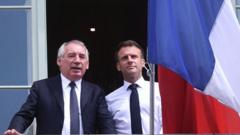President Emmanuel Macron has officially appointed François Bayrou, the centrist leader of the MoDem party, as France's new prime minister. This move comes as a response to ongoing political instability that has plagued the French government for several months. Macron's selection of Bayrou, a long-time ally originating from the southwest, follows a period of intense negotiations characterized by notably tense discussions, according to French media.
With Macron in the middle of his second presidential term, this new appointment signifies his fourth prime minister within a single year, a reflection of the political chaos following the summer's snap parliamentary elections. The situation is further complexified by recent polling data indicating that a significant 61% of French voters are alarmed by the current political climate.
The immediate challenge for Bayrou will be to establish a government that can withstand the criticisms that led to the dismissal of his predecessor. Ex-Brexit negotiator Michel Barnier's government was ousted just nine days after a no-confidence vote, which underscored the precariousness of the current parliamentary situation. Macron's previous attempt to form a minority government with Barnier relied heavily on support from the far-right National Rally, a strategy Macron is now keen to avoid.
As part of Bayrou's inaugural duties, he will relocate to the prime minister's residence and focus on coalition-building efforts. So far, Macron has engaged in discussions with various political faction leaders, with the exception of Jean-Luc Mélenchon’s far-left France Unbowed and Marine Le Pen’s National Rally. Observers are keen to see if Bayrou can entice the center-left factions to join his government or at least refrain from opposition.
Notably, leaders from leftist parties have expressed skepticism about Bayrou's capacity to unify the government, with critical voices, including that of Socialist leader Carole Delga, condemning the entire situation as ludicrous. Meanwhile, the left has seen fractures in its alliances, as reformist factions distance themselves from their more radical counterparts.
Looking forward, the overarching strategy will be whether Macron can craft a centrist coalition capable of navigating the complexities of governing amid divided political blocs. In the backdrop, the lingering shadow of financial mismanagement looms large, as the government grapples with a potential budget deficit hitting 6.1% of GDP this year. The road ahead for Bayrou promises to be filled with hurdles, with the need to balance varied political interests while addressing pressing issues such as immigration and living costs.
As his appointment unfolds, the French public watches closely, hoping that Bayrou can instill a sense of stability and direction, while Macron is determined to keep his administration afloat through to the end of his term in 2027. As this developing story continues, updates will be provided as more information becomes available.





















